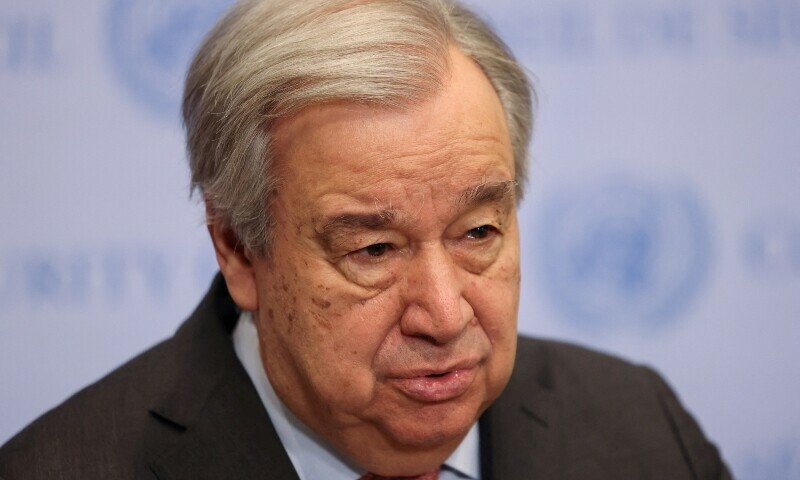Nuclear-armed foes Pakistan and India must exert “maximum restraint” and step back from the brink of war, UN chief Antonio Guterres urged on Monday, as tensions between the South Asian neighbours soared.
The April 22 attack in Pahalgam killed 26 people, mostly tourists, in one of the deadliest assaults since 2000. India, without investigation or evidence, implied “cross-border linkages” of the attackers. Pakistan has firmly rejected the claim and called for a neutral probe.
Tensions have since spiked, with Pakistan reinforcing its forces as it expected an incursion and India’s premier granting “operational freedom” to his military. As temperatures remain high, with the military warning of a “swift” response to any misadventure by New Delhi, diplomatic channels have remained engaged to prevent conflict.
Relations have reached “a boiling point”, Guterres told reporters in New York, adding that they were at their “highest in years”.
He again condemned the April 22 attack in Pahalgam that killed 26 people, calling for those responsible to be brought to justice through “credible and lawful means”.
“It is also essential — especially at this critical hour — to avoid a military confrontation that could easily spin out of control,” the secretary-general warned.
“Now is the time for maximum restraint and stepping back from the brink.”
Pakistan and India have fought multiple wars and remain bitter foes.
International pressure has been piled on both New Delhi and Islamabad to de-escalate.
No group has claimed responsibility for the attack in Kashmir.
Indian Prime Minister Narendra Modi has given his military “full operational freedom” to respond and Islamabad has warned it will hit back against any aggression.
The UN Security Council was due to meet behind closed doors later today at Pakistan’s request over the crisis.
Pahalgam attack attempt to divert attention from India’s cross-border terrorism: Dar
Deputy Prime Minister Ishaq Dar said that the attack was an attempt to “divert attention” from India’s internal challenges and its cross-border terrorism.
Addressing the Regional Dialogue 2025 in Islamabad today, organised by the Institute of Regional Studies, Dar said Pakistan believed the Pahalgam attack was part of an effort to “divert attention” from India’s internal challenges, adding that it could be “self-choreographed”.
“We believe that what has happened is to divert attention — I am talking of Pahalgam — from India’s internal challenges, state-sponsored terrorism, the ongoing human rights violations in the Indian Illegally Occupied Kashmir, and to gain narrow domestic political objectives,” Dar said.
“Don’t forget that there are some by-elections coming in the next few months in India,” he added, referring to the upcoming polls in Bihar in October.
“This brinkmanship carries consequences that extend far beyond India’s borders,” the deputy PM warned, calling India’s actions “unilateral, politically-motivated and highly provocative”.
He noted: “There appears to be a calculated and premeditated attempt to escalate regional tensions, following a familiar pattern — level allegations against Pakistan without evidence, use inflammatory rhetoric, incite war hysteria and use this as a pretext for aggression and unilateral actions.”
In a reference to the Indian government, Dar stressed that regional and international peace and security could not be “sacrificed at the altar of narrow electoral gains”.
“This is a dangerous political game and gamble, putting at stake the lives of millions in the region,” the foreign minister highlighted. However, he also reaffirmed Pakistan’s commitment to regional peace: “We will support all efforts towards de-escalation.”
“Analysts say this could be another ploy. It might have been self-choreographed,” echoing Pakistani leaders’ previous statements of the Pahalgam attack being a “false flag operation”.
“How can an FIR (first information report) be registered in 10 minutes at a police station where you need at least 45 minutes to reach? […] Come on. Nobody’s a fool,” Dar quipped.
“International dignitaries are talking [to] both sides. Few of them — great friends — suggested to me, ‘Can you try and help the perpetrators be caught?’ I said ‘come on, do you know the distance where it happened and where’s the Line of Control? 230 kilometres.”
The deputy PM asserted: “Pakistan has exposed India’s mala fide and they are now on the backfoot. But it takes two to tango. I am telling all these dignitaries that we will show patience and will not be the first ones to attack.
“But if anybody makes any mistake and ventures into adventurism, then God knows what situation that will lead to. I hope sense prevails and they should [reflect].”
He detailed that he has directed Pakistan’s permanent representative to the United Nations to request a meeting of the UN Security Council.
“Let’s share with them the facts and figures and the details and the evidence we showed the other day,” said Dar, referring to his press briefing with the military’s spokesperson, where they accused India of activating its “assets” to intensify terrorist attacks in Pakistan.
“I cannot find the word abeyance in any international treaties’ dictionary. The word suspension is there,” Dar said, referring to India’s unilateral suspension of the Indus Waters Treaty.
UK to ‘work closely’ with Pakistan, India to reduce tensions
Separately, UK High Commissioner to Pakistan Jane Marriott assured PM Shehbaz today that her country would “work closely with Pakistan and India for maintaining regional peace and security”, the Prime Minister Office (PMO) said.
In his meeting with Marriott in Islamabad, PM Shehbaz urged her country to play its part in de-escalating the ongoing tensions with India.
The premier shared Pakistan’s perspective on the prevailing situation in South Asia in the aftermath of the Pahalgam incident and rejected India’s attempts to link Pakistan to the incident without providing any evidence.
He also reiterated his offer for a transparent, credible and neutral international investigation into the incident and invited the UK to join it, the PMO statement added.
Noting that the UK enjoyed “good relations” with both India and Pakistan, PM Shehbaz assured Marriott that Islamabad “would never take any action that could imperil regional peace and security”.
The prime minister stressed that with the support of friendly countries, including the UK, his government’s “foremost priority remained advancing economic growth and development of the country”.
Iran FM meets with PM Shehbaz, army chief: report
Meanwhile, Iran’s Foreign Minister Abbas Araghchi met with Prime Minister Shehbaz Sharif and Chief of Army Staff General Asim Munir on Monday, state broadcaster PTV News said in a post on X.
FM Araghchi, who arrived in Islamabad late last night, also met with Deputy PM Dar.
“Key discussions held with PM Shehbaz Sharif, FM Ishaq Dar and Army Chief Gen Asim Munir,” PTV News stated, highlighting that the visit came amid “rising India-Pakistan tensions after the Pahalgam attack”.
In his meeting with the Iranian FM, PM Shehbaz stressed that India’s weaponisation of the Indus Waters Treaty was unacceptable and a red-line for Pakistan.
According to a statement issued by the Prime Minister’s Office, the premier shared serious concerns over the prevailing tensions in South Asia as a result of India’s provocative behavior since Pahalgam incident.
He categorically rejected any attempts to link Pakistan to the incident, without sharing any evidence and said Pakistan had offered that an international transparent, neutral and credible investigation be conducted to ascertain the facts behind the Pahalgam incident.
While stating that Pakistan had acted with maturity and responsibility, the Prime Minister said, “India had, on the other hand, created a media frenzy to divert the world’s attention away from Jammu and Kashmir dispute, which remained the root cause of instability in South Asia.”
Iran’s FM Araghchi conveyed warm greetings from the Iranian leadership to the prime minister and reaffirmed Iran’s commitment to strengthening its relations with Pakistan and also playing its part in bringing peace and stability in South Asia.
In their meeting, Dar and Araghchi exchanged views on the evolving situation in South Asia and the US-Iran nuclear talks, the Foreign Office said.
Both leaders also agreed that complex issues could be “resolved through diplomacy and negotiations”.
“They appreciated each other’s constructive diplomatic efforts, which demonstrate their shared commitment to peace and stability in the region,” the FO said. As Pak-India tensions persist, FM Araghchi is also expected to visit India later in the week.
According to an FO press release, Dar shared Pakistan’s “serious concerns over the prevailing tensions in South Asia as a result of India’s provocative behaviour” and rejected “unsubstantiated attempts to implicate Pakistan in the incident”.
The foreign minister thanked his Iranian counterpart for making the visit at this “critical juncture”. On his part, Araghchi conveyed cordial greetings from the Iranian leadership and reaffirmed Tehran’s desire to further deepen bilateral relations with Pakistan.
Dar pointed out that Pakistan had “consistently denounced terrorism in all its forms” and underscored the country’s frontline role in the fight against terrorism.
Both foreign ministers also reaffirmed their commitment to strong Pakistan-Iran ties and agreed to boost cooperation in trade, energy, and connectivity.
They also pledged to maintain strong momentum in Pak-Iran relations, including by maintaining an increased frequency of interaction at the leadership level.
Iranian FM Araghchi also called on President Asif Ali Zardari to discuss matters of bilateral and mutual interest, regional security situation, particularly the ongoing tensions between India and Pakistan.
The Iranian foreign minister said that he was undertaking the visit on the instructions of the Supreme Leader Khamenei, and the President of Iran, Masoud Pezeshkian, expressing understanding of Pakistan’s position on the current situation and called for restraint by both sides to de-escalate the tensions.
The president thanked the Iranian Foreign Minister for undertaking the visit to Pakistan at a critical juncture.
He reiterated Pakistan’s commitment to dialogue and diplomacy, while expressing concern over India’s aggressive posture, which he said was endangering regional peace and stability.
China reaffirms ‘time-tested friendship’ with Pakistan
Earlier today, China reaffirmed its support for Pakistan amid escalation with India as President Asif Ali Zardari met with Chinese Ambassador to Pakistan Jiang Zaidong.
During today’s meeting at Aiwan-i-Sadr, Zardari expressed concern over the recent “irresponsible and aggressive rhetoric by the Indian government”, saying that such actions threaten regional peace and stability.
The two discussed matters of bilateral importance, with a particular focus on the ongoing situation between Pakistan and India in the aftermath of the Pahalgam attack.
The Chinese ambassador reaffirmed the “enduring and time-tested friendship between China and Pakistan”, describing the relationship as one of “ironclad brothers” who have always supported each other in challenging times.
He thanked Zardari for sharing Pakistan’s perspective, and emphasised that China would always support its ally to achieve the common desire of both countries to secure peace and stability in South Asia.
Zardari conveyed his deep appreciation and gratitude to the Chinese government for its “consistent support, always standing by Pakistan in difficult times”.
On Thursday, PM thanked China’s envoy for endorsing his offer to conduct a neutral probe into the Pahalgam attack. Last week, China had urged both India and Pakistan to “exercise restraint” as the two countries reportedly exchanged fire at the Line of Control (LoC).
As Pakistan continues diplomatic engagement with various countries to brief them on the ongoing situation, PM Shehbaz yesterday spoke to his Malaysian counterpart, while Dar spoke to the foreign ministers of Malaysia and Russia.
Info minister refutes claims of ‘terrorist hideouts’ during LoC visit
Separately, Information Minister Attaullah Tarar visited the LoC in Azad Jammu and Kashmir with local and foreign media and dismissed India’s allegations of “terrorist hideouts” there, state-run Radio Pakistan reported.
The visit facilitated by the Ministry of Information and Broadcasting was aimed at exposing the “false and baseless Indian propaganda”, the report said, pointing out that media representatives were taken to specific locations that India had allegedly “labelled as terrorist hideouts”.
“By witnessing the ground situation, hearing from the local population, and observing the environment firsthand, the media got the opportunity to assess the truth behind India’s claims,” Radio Pakistan noted.
Among the group of international journalists was CNN’s International Diplomatic Editor Nic Robertson.
According to Radio Pakistan, Robertson visited a village where Muhammad Farooq and Muhammad Deen were killed in a “fake encounter by the Indian army”.
The CNN editor interviewed both men’s bereaved families, who appealed for justice through international media, the report said. No statement by Robertson was found on his social media accounts immediately after the visit.
Speaking on the occasion, Tarar said: “India is now claiming the presence of training camps in Bela Noor Shah, which is near Pir Chinasi, and that they were used in the Pahalgam attack.
“This area is 26 kilometres away from the LoC and the purpose of coming here is to show that Indian propaganda is false, fake, and concocted,” he added.
“India’s narrative has failed miserably, and the international media has not picked it up. There are contradictions in India’s response and they are not able to provide evidence,” the minister said.
He asserted: “There are no terrorist camps here. There are beautiful mountains and people [only].”
“Don’t resort to any misadventure,” Tarar warned, adding that Pakistan would give a befitting response to any Indian aggression and would go to any extent to defend its sovereignty.
Echoing Deputy PM Dar’s statements, Tarar said India uses propaganda to “hide its internal failures”.
Meanwhile, the Pakistan Army again responded to unprovoked firing by the Indian army along the LoC overnight, state broadcaster PTV News reported.
According to security sources, Indian troops resorted to unprovoked firing on multiple Pakistani military posts in Nakyal, Khuiratta, Sharda, Kel, Neelum and Haji Pir sectors along the LoC.
The action was responded to in a befitting manner by the Pakistan Army, PTV News added. It quoted security sources as saying that the armed forces were “fully alert”.
Pakistani troops had previously responded to “unprovoked” Indian firing on April 30. Both countries have reportedly been trading small arms fire since April 25.
Pakistan to brief UNSC on latest regional developments
Acting on a global level, Islamabad has decided to seek an immediate session of the United Nations Security Council (UNSC) to apprise world powers about the recent tensions with India.
The Foreign Office said FM Dar has issued directions to Pakistan’s permanent representative to the United Nations, Ambassador Asim Iftikhar, to take immediate steps for the UNSC session.
“Pakistan will particularly brief the UNSC on how India’s aggressive actions, repeated provocations and inflammatory rhetoric pose a serious threat to regional and global peace and stability”, an FO press release issued today said.
It added that Pakistan would call upon the UNSC to “exercise its primary responsibility for the maintenance of international peace and security by taking appropriate measures to address these concerning developments”.
“It will also highlight India’s unlawful and unilateral attempt to put the Indus Waters Treaty in abeyance — a clear violation of its international obligations,” the FO said.
The instructions came two days after Ambassador Iftikhar said Pakistan was closely following the situation stemming from India’s aggressive moves in the wake of the Pahalgam attack and would seek a UNSC meeting at an appropriate time.









